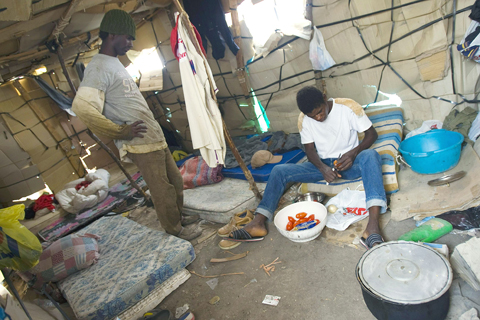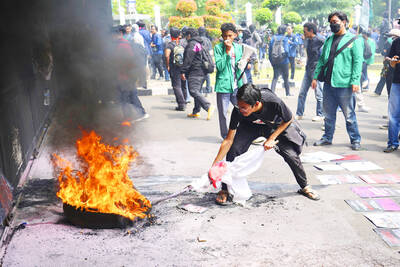After crossing half of Africa and surviving a perilous boat trip from Libya in search of a better life in Italy, Boubacar Bailo is now contemplating suicide.
One of an army of illegal immigrants hired to harvest tomatoes in the Puglia region, Bailo squats in a fetid cardboard shack restlessly waiting for a call to the fields.
Every year thousands of immigrants, many from Africa, flock to the fields and orchards of southern Italy to scrape a living as seasonal workers picking grapes, olives, tomatoes and oranges.

PHOTO: REUTERS
Broadly tolerated by authorities because of their role in the economy, they endure long hours of backbreaking work for as little as 15 euros to 20 euros (US$22 to US$29) a day and live in squalid makeshift camps without running water or electricity.
“I never thought it would be like this in Italy. Even dogs are better off than us,” said Bailo, a 24-year-old from Guinea struggling to survive in an area of Puglia known as the “Red Gold Triangle” which produces 35 percent of Italy’s tomatoes.
“It’s better to die than to live like this, because at least when you die your problems are over,” he said.
Things have been particularly bad this year in Puglia, whose tomatoes end up in dishes around the world, from the upscale restaurants of London to the homes of the village of San Marco just a few miles away. The economic crisis forced factories in Italy’s rich north to shut down or lay off employees, so more migrants than usual — around 2,000 people — have come here in search of work.
Rains — a tomato picker’s best friend because the machinery an increasing number of farm owners use to replace manual labor does not work properly on muddy grounds — have been sparse.
And a crackdown by Italy’s conservative government on illegal immigration has made farmers more reluctant to hire clandestini workers, particularly those easily identifiable as foreigners because of their skin color.
This month, the government launched an amnesty for immigrants illegally employed in cleaning or caring for the elderly by families, but that does not apply to those bringing tomatoes in from the fields.
Bailo, who was denied an asylum request and has no papers, says he has worked eight days in the past two months “and I didn’t even put 100 euros in my pocket.”
The going rate for illegal tomato pickers is 3.5 euros per cassone — a big plastic crate that, when full, weighs 350kg. On a good day, workers can hope to make as much as 35 euros to 40 euros from laboring from dawn to dusk.
But in most cases they will have to pay a cut to the so-called caporali, middlemen who select the workforce for the farm owners and make sure the job gets done.
“It’s a feudal system like in the Middle Ages. These modern slaves are handy for the economy: you can exploit them and then get rid of them when you don’t need them anymore,” said Father Arcangelo Maira, a priest trying to help the immigrants.
The shanty town where Bailo lives in the countryside along with 600 fellow immigrants is known as “the Ghetto.” From afar, it resembles a refugee camp in any war-ravaged African country, but the reality is possibly worse.
People sleep on bug-infested mattresses in overcrowded shacks made of cardboard and plastic sheets or in decrepit houses. Idle youths in dirty clothes brush off the mud from broken shoes, or play draughts using rocks on makeshift boards.
A group of men slaughters a goat in a corner.
After turning a blind eye for years, regional authorities in August set up 60 portable toilets and 20 water tanks to serve an estimated 1,500 immigrants until next month, when most will move further south to the Calabria region for the orange harvest. Cheap accommodation for up to 300 people is also being readied.
But medical charity Doctors Without Borders (MSF), which since 2003 has been monitoring the area and helping immigrants get access to basic health services, says more should be done.
“The conditions in which they live and eat are extremely precarious. These are young, strong people who arrive in Italy in good health and fall sick here,” MSF doctor Alvise Benelli said.
Spending hours kneeling or bending in the fields means that many suffer from back and muscle pain. The lack of hygiene causes skin and intestinal diseases. There is also an increasing number of people suffering from depression.
“They left their country and came here hoping to find an El Dorado, but they end up living in conditions that are often worse than what they had at home,” Benelli said.

The head of Shin Bet, Israel’s domestic intelligence agency, was sacked yesterday, days after Israeli Prime Minister Benjamin Netanyahu said he no longer trusts him, and fallout from a report on the Oct. 7, 2023, Hamas attack. “The Government unanimously approved Prime Minister Benjamin Netanyahu’s proposal to end ISA Director Ronen Bar’s term of office,” a statement said. He is to leave his post when his successor is appointed by April 10 at the latest, the statement said. Netanyahu on Sunday cited an “ongoing lack of trust” as the reason for moving to dismiss Bar, who joined the agency in 1993. Bar, meant to

Indonesia’s parliament yesterday amended a law to allow members of the military to hold more government roles, despite criticisms that it would expand the armed forces’ role in civilian affairs. The revision to the armed forces law, pushed mainly by Indonesian President Prabowo Subianto’s coalition, was aimed at expanding the military’s role beyond defense in a country long influenced by its armed forces. The amendment has sparked fears of a return to the era of former Indonesian president Suharto, who ex-general Prabowo once served and who used military figures to crack down on dissent. “Now it’s the time for us to ask the

The central Dutch city of Utrecht has installed a “fish doorbell” on a river lock that lets viewers of an online livestream alert authorities to fish being held up as they make their springtime migration to shallow spawning grounds. The idea is simple: An underwater camera at Utrecht’s Weerdsluis lock sends live footage to a Web site. When somebody watching the site sees a fish, they can click a button that sends a screenshot to organizers. When they see enough fish, they alert a water worker who opens the lock to let the fish swim through. Now in its fifth year, the

‘INCREDIBLY TROUBLESOME’: Hours after a judge questioned the legality of invoking a wartime power to deport immigrants, the president denied signing the proclamation The US on Friday said it was terminating the legal status of hundreds of thousands of immigrants, giving them weeks to leave the country. US President Donald Trump has pledged to carry out the largest deportation campaign in US history and curb immigration, mainly from Latin American nations. The order affects about 532,000 Cubans, Haitians, Nicaraguans and Venezuelans who came to the US under a scheme launched in October 2022 by Trump’s predecessor, Joe Biden, and expanded in January the following year. They would lose their legal protection 30 days after the US Department of Homeland Security’s order is published in the Federal